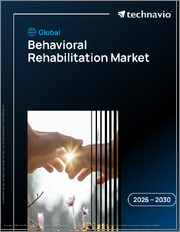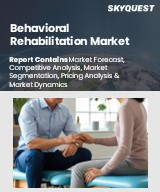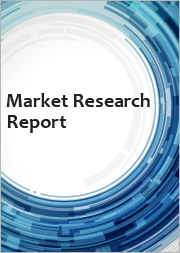
|
시장보고서
상품코드
1532636
행동 재활 시장 : 질환 유형, 헬스케어 환경, 치료별 - 세계 예측(2024-2032년)Behavioral Rehabilitation Market - By Disorder Type (Anxiety, Mood, Substance Abuse, Personality, Attention Deficit Disorders), Healthcare Setting (Inpatient, Residential, Outpatient), Treatment (Counselling, Medication) - Global Forecast (2024 - 2032) |
||||||
세계의 행동 재활 시장은 2024-2032년 5.9%의 CAGR을 보이며, 기술의 통합과 치료의 개별화가 촉진요인입니다.
AI 기반 플랫폼 및 디지털 헬스 솔루션과 같은 첨단 기술은 재활 서비스의 효과와 접근성을 향상시킵니다. 이러한 혁신은 환자 개개인의 필요와 선호도에 따라 맞춤형 치료 계획을 수립할 수 있게 해 환자의 치료 결과를 개선합니다. 기술이 발전하고 개인화된 접근 방식이 대중화됨에 따라 보다 정확하고 효율적이며 매력적인 재활 경험을 제공함으로써 시장이 확대되고 정신건강 지원을 원하는 사람들의 다양한 요구를 충족시킬 수 있습니다.
예를 들어 2023년 9월 Discovery Behavioral Health, Inc.는 Videra Health 및 주요 연구 병원과 공동으로 개발한 AI 기반 플랫폼 Discovery365를 출시하여 "1년의 회복 격차"를 해결하고 있습니다. 이 개발은 "1년의 회복 격차"를 해소하고 환자의 치료 결과를 개선하기 위한 것으로, 정신 헬스케어 분야의 기술 통합이 진행되고 있음을 강조하고 있습니다. 이러한 혁신적인 솔루션의 도입은 행동 재활에 있으며, 보다 개인화된 데이터베이스 접근 방식으로의 전환을 강조하며, 잠재적으로 치료 효과를 높이고 시장 기회를 확대할 수 있습니다.
행동재활 산업은 장애 유형, 의료 환경, 치료, 지역별로 분류됩니다.
기분장애 분야는 우울증과 양극성 장애와 같은 질환의 높은 유병률과 심각한 영향으로 인해 2032년까지 눈에 띄게 개선될 것으로 예상됩니다. 이러한 질환은 치료, 약물 관리, 지원 프로그램 등 광범위하고 지속적인 재활 서비스를 필요로 하는 경우가 많습니다. 정신건강 문제에 대한 인식이 높아지고 전문적인 치료 옵션에 대한 수요가 증가하면서 기분 장애 시장이 지배적인 위치를 차지하게된 배경입니다. 인식과 치료 옵션이 계속 확대됨에 따라 이 분야는 시장 성장을 크게 견인할 가능성이 높습니다.
약물치료 분야는 다양한 정신건강 상태를 관리하는 데 중요한 역할을 하므로 2024-2032년 눈에 띄는 성장세를 보일 것으로 예상됩니다. 항우울제, 항정신병약, 기분 안정제 등의 약물은 기분 장애, 불안 및 기타 정신 질환의 치료에 필수적입니다. 증상 완화 및 환자 예후 개선에 대한 효과로 인해 높은 수요를 견인하고 있습니다. 점점 더 많은 사람들이 재활의 일환으로 약리학적 치료를 찾고 있는 가운데, 약물 치료 분야는 여전히 정신 헬스케어의 주요하고 필수적인 요소로 남아 있습니다.
아시아태평양의 행동 재활 시장은 2024-2032년 상당한 점유율을 차지할 것으로 예상되는데, 이는 이 지역 인구의 급속한 증가와 정신건강 문제에 대한 인식이 높아졌기 때문입니다. 의료 인프라의 확대와 가처분 소득 증가는 행동 의료 서비스에 대한 접근성 향상에 기여하고 있습니다. 또한 정신 헬스케어를 개선하기 위한 문화적 변화와 정부의 구상은 시장 성장을 더욱 촉진하고 있습니다. 아시아태평양은 정신건강 자원과 서비스에 대한 지속적인 투자로 인해 세계 행동재활 산업에 매우 중요한 기여를 하고 있습니다.
목차
제1장 조사 방법과 조사 범위
제2장 개요
제3장 업계 인사이트
- 에코시스템 분석
- 업계에 대한 영향요인
- 촉진요인
- 행동·정신건강에 대한 의식의 향상과 구상
- 정신건강 및 행동 건강 장애의 유병률 상승
- 원격의료와 온라인 카운셀링 서비스의 채택 증가
- 업계의 잠재적 리스크 & 과제
- 중저소득국에서 서비스의 고비용
- 행동 장애에 대한 사회적·문화적 제약
- 촉진요인
- 성장 가능성 분석
- 기술적 전망
- 규제 상황
- 향후 시장 동향
- 재활치료의 디지털 진화 : 현재 동향과 향후 방향성
- 스타트업 시나리오
- Porter의 산업 분석
- PESTEL 분석
제4장 경쟁 구도
- 서론
- 기업 점유율 분석
- 기업 매트릭스 분석
- 주요 시장 기업의 경쟁 분석
- 경쟁 포지셔닝 매트릭스
- 전략 대시보드
제5장 시장 추산·예측 : 질환 유형별, 2021-2032년
- 주요 동향
- 불안 장애
- 기분 장애
- 물질 남용 장애
- 성격장애
- 주의력결핍장애
- 기타 장애 유형
제6장 시장 추산·예측 : 헬스케어 환경별, 2021-2032년
- 주요 동향
- 입원 환자
- 주택
- 외래 환자
제7장 시장 추산·예측 : 치료별, 2021-2032년
- 주요 동향
- 카운셀링
- 약물 요법
- 지원 서비스
- 기타 치료 방법
제8장 시장 추산·예측 : 지역별, 2021-2032년
- 주요 동향
- 북미
- 미국
- 캐나다
- 유럽
- 독일
- 영국
- 프랑스
- 스페인
- 이탈리아
- 네덜란드
- 기타 유럽
- 아시아태평양
- 일본
- 중국
- 인도
- 호주
- 한국
- 기타 아시아태평양
- 라틴아메리카
- 브라질
- 멕시코
- 아르헨티나
- 기타 라틴아메리카
- 중동 및 아프리카
- 사우디아라비아
- 남아프리카공화국
- 아랍에미리트
- 기타 중동 및 아프리카
제9장 기업 개요
- AAC Holdings, Inc.
- Acadia Healthcare Company, Inc.
- Behavioral Health Group(BHG)
- Caron Treatment Centers
- Elements Behavioral Health
- Foundations Recovery Network
- Futures Recovery Healthcare
- Hazelden Betty Ford Foundation
- Lakeview Health
- Landmark Recovery
- Newport Academy
- Promises Behavioral Health
- Springstone, Inc.
- The Priory Group
- Universal Health Services, Inc.
Global Behavioral Rehabilitation Market will exhibit 5.9% CAGR from 2024 to 2032, fueled by the integration of technology and personalization of treatment. Advanced technologies, such as AI-driven platforms and digital health solutions, enhance the effectiveness and accessibility of rehabilitation services. These innovations enable tailored treatment plans that address individual needs and preferences, improving patient outcomes. As technology evolves and personalized approaches become more prevalent, they offer more precise, efficient, and engaging rehabilitation experiences, thus expanding the market and meeting the diverse needs of those seeking mental health support.
For instance, in September 2023, Discovery Behavioral Health, Inc. launched Discovery365, an AI-driven platform developed with Videra Health and a leading research hospital, to address the "one year recovery gap." This development highlights the growing integration of technology in mental health care, aiming to bridge the "One Year Recovery Gap" and improve patient outcomes. The introduction of such innovative solutions underscores a shift towards more personalized and data-driven approaches in behavioral rehabilitation, potentially enhancing treatment efficacy and expanding market opportunities.
The behavioral rehabilitation industry is classified based on disorder type, healthcare setting, treatment, and region.
The mood disorders segment will experience a marked upturn through 2032 due to the high prevalence and significant impact of conditions such as depression and bipolar disorder. These disorders often require extensive and ongoing rehabilitation services, including therapy, medication management, and support programs. The growing recognition of mental health issues and the increasing demand for specialized treatment options contribute to the dominant market position of mood disorders. As awareness and treatment options continue to expand, this segment will likely drive substantial market growth.
The medication segment will observe a noteworthy surge between 2024 and 2032, driven by its crucial role in managing various mental health conditions. Medications such as antidepressants, antipsychotics, and mood stabilizers are essential in treating mood disorders, anxiety, and other psychiatric conditions. Their effectiveness in alleviating symptoms and improving patient outcomes drives high demand. As more individuals seek pharmacological treatments as part of their rehabilitation process, the medication segment remains a dominant and integral component of mental health care.
Asia Pacific behavioral rehabilitation market will achieve a remarkable share from 2024 to 2032, attributed to the region's rapidly growing population and increasing awareness of mental health issues. Expanding healthcare infrastructure and rising disposable incomes contribute to greater access to behavioral health services. Additionally, cultural shifts and government initiatives aimed at improving mental health care further boost market growth. As the region continues to invest in mental health resources and services, Asia Pacific will stand out as a pivotal contributor to the global behavioral rehabilitation industry.
Table of Contents
Chapter 1 Methodology & Scope
- 1.1 Market scope & definitions
- 1.2 Research design
- 1.2.1 Research approach
- 1.2.2 Data collection methods
- 1.3 Base estimates & calculations
- 1.3.1 Base year calculation
- 1.3.2 Key trends for market estimation
- 1.4 Forecast model
- 1.5 Primary research and validation
- 1.5.1 Primary sources
- 1.5.2 Data mining sources
Chapter 2 Executive Summary
- 2.1 Industry 360° synopsis
Chapter 3 Industry Insights
- 3.1 Industry ecosystem analysis
- 3.2 Industry impact forces
- 3.2.1 Growth drivers
- 3.2.1.1 Growing awareness and initiatives for behavioral and mental health
- 3.2.1.2 Rise in prevalence of mental health and behavioral health disorders
- 3.2.1.3 Increasing adoption of telemedicine and online counseling services
- 3.2.2 Industry pitfalls & challenges
- 3.2.2.1 High cost of services in low- and middle-income countries
- 3.2.2.2 Social and cultural constraints for behavioral disorders
- 3.2.1 Growth drivers
- 3.3 Growth potential analysis
- 3.4 Technological landscape
- 3.5 Regulatory landscape
- 3.6 Future market trends
- 3.7 Digital evolution of rehabilitation: current trends and future directions
- 3.8 Start-up scenario
- 3.9 Porter's analysis
- 3.10 PESTEL analysis
Chapter 4 Competitive Landscape, 2023
- 4.1 Introduction
- 4.2 Company market share analysis
- 4.3 Company matrix analysis
- 4.4 Competitive analysis of major market players
- 4.5 Competitive positioning matrix
- 4.6 Strategy dashboard
Chapter 5 Market Estimates and Forecast, By Disorder Type, 2021 - 2032 ($ Mn)
- 5.1 Key trends
- 5.2 Anxiety disorders
- 5.3 Mood disorders
- 5.4 Substance abuse disorders
- 5.5 Personality disorders
- 5.6 Attention deficit disorders
- 5.7 Other disorder types
Chapter 6 Market Estimates and Forecast, By Healthcare Setting, 2021 - 2032 ($ Mn)
- 6.1 Key trends
- 6.2 Inpatient
- 6.3 Residential
- 6.4 Outpatient
Chapter 7 Market Estimates and Forecast, By Treatment Method, 2021 - 2032 ($ Mn)
- 7.1 Key trends
- 7.2 Counselling
- 7.3 Medication
- 7.4 Support services
- 7.5 Other treatment methods
Chapter 8 Market Estimates and Forecast, By Region, 2021 - 2032 ($ Mn)
- 8.1 Key trends
- 8.2 North America
- 8.2.1 U.S.
- 8.2.2 Canada
- 8.3 Europe
- 8.3.1 Germany
- 8.3.2 UK
- 8.3.3 France
- 8.3.4 Spain
- 8.3.5 Italy
- 8.3.6 Netherlands
- 8.3.7 Rest of Europe
- 8.4 Asia Pacific
- 8.4.1 Japan
- 8.4.2 China
- 8.4.3 India
- 8.4.4 Australia
- 8.4.5 South Korea
- 8.4.6 Rest of Asia Pacific
- 8.5 Latin America
- 8.5.1 Brazil
- 8.5.2 Mexico
- 8.5.3 Argentina
- 8.5.4 Rest of Latin America
- 8.6 Middle East and Africa
- 8.6.1 Saudi Arabia
- 8.6.2 South Africa
- 8.6.3 UAE
- 8.6.4 Rest of Middle East and Africa
Chapter 9 Company Profiles
- 9.1 AAC Holdings, Inc.
- 9.2 Acadia Healthcare Company, Inc.
- 9.3 Behavioral Health Group (BHG)
- 9.4 Caron Treatment Centers
- 9.5 Elements Behavioral Health
- 9.6 Foundations Recovery Network
- 9.7 Futures Recovery Healthcare
- 9.8 Hazelden Betty Ford Foundation
- 9.9 Lakeview Health
- 9.10 Landmark Recovery
- 9.11 Newport Academy
- 9.12 Promises Behavioral Health
- 9.13 Springstone, Inc.
- 9.14 The Priory Group
- 9.15 Universal Health Services, Inc.
















